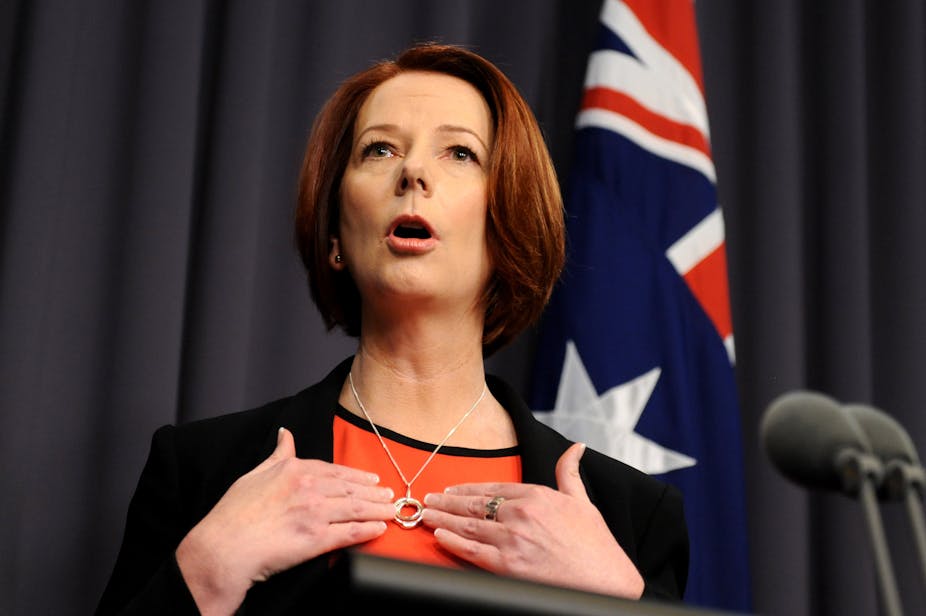The recent drama about Julia Gillard’s activities on behalf of one faction of the Australian Workers’ Union back in the early 1990s is another chapter in the long story of money in Australian unions.
Parliament is only one institution in Australian society; there are churches, clubs, trade unions and business corporations. The internal practices of trade unions are frequently the object of scrutiny as to how democratic they are or to what extent office-bearers fulfil their responsibilities. The same level of scrutiny is very rarely applied to the corporate sector, where large institutional shareholders dominate corporations, individual shareholders play little role, and votes at company general meetings are usually formalities. For many churches, an undemocratic internal structure is symbol of their status as “civil society” organisations.
Trade unions are an exception. They are constituted on the basis of one-vote-one-value. This principle has not always been acknowledged. Ruling groups once manipulated elections – the Communist Party became notorious for this – but it was as common, or more common, on the right. Although the letter of union democracy has been maintained, often its spirit has been weak. Incumbents are usually favoured in union elections, for example.
The AWU has been a notable example of this. Its conservative, anti-Communist and devoutly labourist leadership was frequently challenged by internal dissenters in the 1960s. The AWU leadership fought back against dissenters by using ballot manipulation, arbitrary reconstructions of dissident branches, and even cooperation with employers against militants.
Union electoral battles are often reflections of broader social conflict: in particular the battle between left and right during the Cold War. In the early 1990s, worker resentment at economic restructuring and employer offensives generated substantial internal dissent among many unions.
Some Victorian AWU members were so unhappy that support emerged for a breakaway “Shearers and Rural Workers’ Union”, but their dissent also impelled the victory of a left-wing “reform group” within the union. Around the same time, long established, right-wing leaderships were overthrown in the Federated Clerks’ Union, the Transport Workers’ Union (TWU) and the Hospital Employees’ Federation (HEF).
These left-wing victories ran counter to the broader social trend of a shift to the right. Unions struggled for survival due to high unemployment and employer militancy, while the broader labour movement was disoriented by the collapse of Communism and political Labor’s shift to neo-liberalism. Of the four new “reform” union leaderships of this era, only that of the Federated Clerks survived in Victoria as a significant political force on the left. The erratic TWU reform group was defeated by a revived right in the union and the AWU and HEF reform leaderships drifted towards the right.
But all this came at a cost. Union election campaigning is expensive. An often disengaged membership has to be bombarded with leaflets and phone calls to get them to vote. It was inevitable that a newly elected reform Victorian AWU leadership, which was in constant conflict with the conservative national leadership, should seek to build a campaign infrastructure.
The so-called “slush fund” that is now haunting Julia Gillard had the potential to guard against corruption: campaign funds were to be under the control of an incorporated association rather than parked in individual bank accounts. We now know that any hope of such protection was unfulfilled.
Part of the explanation for what went wrong is a matter of personality, the reappearance of a labour movement archetype; the amiable knockabout who charms the membership but confuses individual and organisational interests. Labour historians know this type. “Jock” Garden, NSW Labor Council secretary of the 1920s and 1930s and a leading Communist, was a classic example. More recently, the Jeff and Kathy Jackson partnership of the Health Services Union is another example. The Victorian AWU leadership of the early 1990s, and in particular the now notorious Bruce Wilson, also fit this description, which is bad luck for Julia Gillard.
The great labour historian VG Childe complained in 1923 that political Labor, “starting with a band of inspired Socialists, degenerated into a vast machine for capturing political power, but did not know how to use that political power except for the profit of individuals”.
To Childe, this failure was a direct product of Labor’s rejection of socialism for populism. “Such is the history of all Labour organisations in Australia,” he wrote, “And that is not because they are Australian, but because they are Labour”.
Ninety years on, Childe’s diagnosis may be more accurate than ever.

